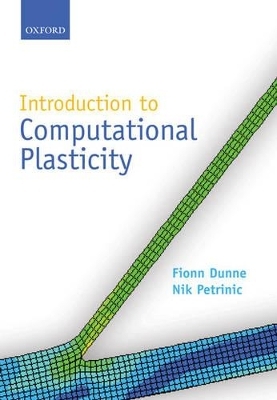
Introduction to Computational Plasticity
Seiten
2005
Oxford University Press (Verlag)
978-0-19-856826-1 (ISBN)
Oxford University Press (Verlag)
978-0-19-856826-1 (ISBN)
The book covers an introduction to the computational analysis of plasticity in engineering materials and structures. The general theory is presented which, wherever possible, is reduced to simple, one-dimensional forms to develop understanding and a good 'physical feel' for the theory. Implementations of the theory in to modern computer solution techniques are described and several examples given.
This book gives an introduction to computational plasticity and includes the kinematics of large deformations, together with relevant continuum mechanics. Central to the book is its focus on computational plasticity, and we cover an introduction to the finite element method which includes both quasi-static and dynamic problems. We then go on to describe explicit and implicit implementations of plasticity models in to finite element software. Throughout the book, we describe the general, multiaxial form of the theory but uniquely, wherever possible, reduce the equations to their simplest, uniaxial form to develop understanding of the general theory and, we hope, physical insight. We provide several examples of implicit and explicit implementations of von Mises time-independent and visco-plasticity in to the commercial code ABAQUS (including the fortran coding), which should prove invaluable to research students and practising engineers developing ABAQUS 'UMATs'. The book bridges the gap between undergraduate material on plasticity and existing advanced texts on nonlinear computational mechanics, which makes it ideal for students and practising engineers alike. It introduces a range of engineering applications, including superplasticity, porous plasticity, cyclic plasticity and thermo-mechanical fatigue, to emphasize the subject's relevance and importance.
This book gives an introduction to computational plasticity and includes the kinematics of large deformations, together with relevant continuum mechanics. Central to the book is its focus on computational plasticity, and we cover an introduction to the finite element method which includes both quasi-static and dynamic problems. We then go on to describe explicit and implicit implementations of plasticity models in to finite element software. Throughout the book, we describe the general, multiaxial form of the theory but uniquely, wherever possible, reduce the equations to their simplest, uniaxial form to develop understanding of the general theory and, we hope, physical insight. We provide several examples of implicit and explicit implementations of von Mises time-independent and visco-plasticity in to the commercial code ABAQUS (including the fortran coding), which should prove invaluable to research students and practising engineers developing ABAQUS 'UMATs'. The book bridges the gap between undergraduate material on plasticity and existing advanced texts on nonlinear computational mechanics, which makes it ideal for students and practising engineers alike. It introduces a range of engineering applications, including superplasticity, porous plasticity, cyclic plasticity and thermo-mechanical fatigue, to emphasize the subject's relevance and importance.
Dr Fionn Dunne is Reader in Engineering Science, University of Oxford Dr Nik Petrinic is Lecturer in Engineering Science, University of Oxford
1. Microplasticity ; 2. Continuum Plasticity ; 3. Kinematics of Large Deformations and Continuum Mechanics ; 4. The Finite Element Method for Static and Dynamic Plasticity ; 5. Implicit and Explicit Integration of von Mises Plasticity ; 6. Implementation of Plasticity Models in to Finite Element Code ; 7. Superplasticity ; 8. Porous Plasticity: the Duva and Crow Model ; 9. Creep in an Aero-Engine Combustor Material ; 10. Cyclic Plasticity, Creep and TMF ; A. Elements of Tensor Algebra ; B. Fortran Coding available via the OUP web site
| Erscheint lt. Verlag | 1.8.2005 |
|---|---|
| Zusatzinfo | numerous halftones and figure; 2pp colour plates |
| Verlagsort | Oxford |
| Sprache | englisch |
| Maße | 173 x 247 mm |
| Gewicht | 607 g |
| Themenwelt | Mathematik / Informatik ► Mathematik |
| Naturwissenschaften ► Physik / Astronomie ► Angewandte Physik | |
| Naturwissenschaften ► Physik / Astronomie ► Festkörperphysik | |
| Naturwissenschaften ► Physik / Astronomie ► Mechanik | |
| Technik ► Maschinenbau | |
| ISBN-10 | 0-19-856826-6 / 0198568266 |
| ISBN-13 | 978-0-19-856826-1 / 9780198568261 |
| Zustand | Neuware |
| Haben Sie eine Frage zum Produkt? |
Mehr entdecken
aus dem Bereich
aus dem Bereich
Buch | Hardcover (2012)
Westermann Schulbuchverlag
CHF 44,90
Schulbuch Klassen 7/8 (G9)
Buch | Hardcover (2015)
Klett (Verlag)
CHF 29,90
Buch | Softcover (2004)
Cornelsen Verlag
CHF 23,90


